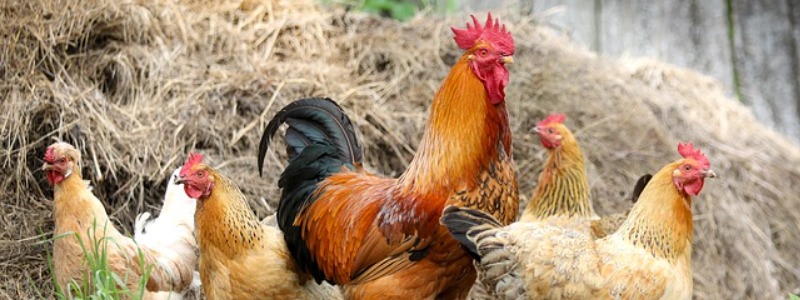Backyard Chicken Guides
Contents
Keeping backyard chickens is becoming increasingly popular, and for good reason. Not only do they provide fresh and delicious eggs, but they also make great pets and even help improve your garden. These feathered friends have plenty of benefits that go beyond providing breakfast. From reducing pests and weeds to fertilizing soil, backyard chickens can be an excellent addition to your family and garden.
In this section, we will dive into the reasons why backyard chickens are the perfect addition to your family and garden and provide you with all the information you need to get started with raising your own chickens. Get ready to discover the joys of raising your own backyard chickens!
Feather Lice in Backyard Chickens
Dealing with Feather Lice: A Comprehensive GuideContentsDealing with Feather Lice: A Comprehensive GuideWhat is Feather Lice?How do you know if your chickens have feather lice?Common types of feather liceShaft liceFluffy…
Chicken Tractors
Move over free range: Chicken tractors for backyard farmsContentsMove over free range: Chicken tractors for backyard farmsWhat is a Chicken tractor?Benefits of Chicken Tractors over Free-RangeHow to Build a Chicken…
How long do chicks need a heat lamp?
So your chicks are several weeks old, and maybe you have them inside, and they are starting to stink, am I right? Been there, done that! So, let’s talk about…
What are backyard chickens?
Backyard chickens are domesticated chickens that are kept by families in their backyard or garden. They are a great addition to any family, especially those who are looking to become more self-sufficient or eco-friendly.
Backyard chickens are usually allowed to roam freely in a designated area and are provided with a coop for protection and comfort. They are a great way to provide fresh, organic eggs for your family, and can also help to reduce household waste by eating food scraps and insects.
In addition, backyard chickens can be a fun and educational experience for children, teaching them responsibility and respect for animals. They also provide an opportunity for families to bond and spend time together while caring for their feathered friends.
Benefits of keeping backyard chickens
There are many benefits to keeping backyard chickens that go beyond just having fresh eggs for breakfast. For one, chickens are excellent garden helpers. They love to scratch and peck at the ground, which helps to aerate and fertilize the soil. Their droppings are also a great source of nitrogen and other nutrients that will give your plants a boost.
In addition to their garden benefits, chickens are also great pets. They have unique personalities and can be quite affectionate towards their owners. They are also very low maintenance and require minimal space compared to other pets.
Chickens are also a great way to teach children about responsibility and sustainability. Children can help with the daily care of the chickens, such as feeding and watering them, collecting eggs, and cleaning the coop. This can teach them important life skills and help them understand where their food comes from.
Finally, backyard chickens are a sustainable and eco-friendly choice. By raising your own chickens, you are reducing your reliance on store-bought eggs, which often come from factory farms with poor animal welfare standards. You can also compost your chicken’s waste, which helps to reduce your household waste and create a valuable fertilizer for your garden.
Tips for raising happy and healthy chickens
Raising backyard chickens can be an incredibly rewarding experience, but it’s important to ensure that your feathered friends are happy and healthy. Here are some tips to help you achieve just that:
- Provide them with enough space: Chickens need plenty of space to move around and stretch their legs. A good rule of thumb is to allow for at least 4 square feet of space per bird in the coop and at least 10 square feet of space per bird in the yard.
- Feed them a healthy diet: Chickens need a diet that is rich in protein, vitamins, and minerals to grow and lay eggs. A balanced diet includes a mix of commercial chicken feed, fresh fruits and vegetables, and access to bugs and insects.
- Keep their living quarters clean: Dirty living quarters can lead to disease and illness in chickens. Make sure to clean out their coop regularly and provide fresh bedding.
- Protect them from predators: Chickens are vulnerable to a wide variety of predators, including raccoons, foxes, and hawks. Make sure to secure their coop and run with sturdy fencing and locks to keep them safe.
- Provide them with entertainment: Chickens are social creatures and enjoy playing and exploring. Provide them with toys and activities, such as a dust bath or a chicken swing, to keep them happy and engaged.
Common problems with backyard chickens and how to solve them
While backyard chickens can be a delightful addition to your family and garden, like any other animals, they come with their own set of challenges. Here are some common problems with backyard chickens and how to solve them:
Predators
Chickens are a target for many predators such as foxes, raccoons, and hawks. Ensure that the coop and run are secure and that your birds have a safe place to roost at night. Consider using electric fencing, which can be an effective deterrent for predators.
Diseases
Chickens are susceptible to various diseases, such as avian influenza, salmonella, and coccidiosis. To prevent the spread of diseases, ensure that your coop and run are clean and dry. Practice good hygiene, such as washing your hands after handling the chickens or their eggs.
Egg-laying problems
Chickens may experience egg-laying problems such as soft-shelled eggs, egg-binding, or egg-eating. Providing a comfortable and stress-free environment, a nutritionally balanced diet, and enough calcium can help prevent these problems.
Broodiness
Some breeds of chickens are prone to becoming broody, meaning they want to sit on their eggs and hatch them. This can be a problem if you are not interested in hatching chicks. To discourage broodiness, remove the eggs immediately after they are laid and do not provide a cozy place where the hen can sit.




